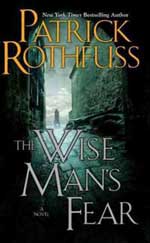
Note: There are going to be some spoilers for The Wise Man’s Fear below. I don’t feel like I can really explain my opinions about the book without delving into that kind of territory, so come back later if you haven finished the book yet but plan on it.
It’s disappointing, really. I generally liked Patrick Rothfus’s initial book in his fantasy series, The Name of the Wind, which introduced us to the trouper orphan Kvothe and promised to tell us both how his extravagant legend grew and what the truth behind it really was. We saw Kvothe live on the streets, use his native wit and ability to get into The University, and then saw him start to make a name for himself while trying to learn what he could about the mysterious company that foisted that whole “orphan” status on him. The book was framed in an interesting way by “present day†Kvothe telling his story to two men: one who wants to tease the truth apart from the legend and one who wants truth to become legend again.
The Wise Man’s Fear continues Kvothe’s story, and while it’s still got some of the interesting world building and character moments that the first book does, it’s also got some crippling flaws that made it hard for me to get through the book if for no other reason that the constant face palming kept blocking my view of the page.
First among these is the fact that Rothfus spends the first chunk of the book retreading territory well worn from the first volume. We get to see more of Kvothe puttering around the University, more of Kvothe being poor, more of Kvothe pining after his untouchable lady love, more of Kvothe feuding with the obligatory rich bully kid, more of Kvothe imperiling his health for the services of a money lender, and generally more of everything we got in the last half of the first book. And this isn’t just a quick refresher to help span the long wait between books; the author spends THREE HUNDRED AND SIXTY FIVE PAGES rehashing.
Then, when Kvothe does move on, Rothfus pointedly refuses to discuss an entire adventure involving “a storm, piracy, treachery, and shipwreck.” Granted, you could view this as more deconstruction of the genre on Rothfus’s part, but what it really did was make the retreading of University life seem even more glaring. And while things do get a little more interesting after we leave the University, this is quickly followed by the two biggest face palms of the whole book. One of my complaints about The Name of the Wind was that Kvothe was a bit of a “Mary Sue†in that he was super good at everything and way too mature for a kid in his early teens. Kvothe excels at almost every subject, is a master musician, a clever magician, a brilliant engineer, a fleet-footed burglar, and more. Rothfus does not rectify this in the second book, but rather exacerbates it. In fact, at points it rather embodies some of the most embarrassing male wish fulfillment fantasy that the genre has to offer.
To wit: at one point Wise Man’s Fear’s plot lurches to the left and Kvothe suddenly runs off to …well, I’ve really got no other way to say it: he learns to have sex real good. He becomes (or is naturally) supernaturally good at the sex, in fact, because his tutelage comes from the ancient goddess of …sex. Of course. I won’t go into details, but suffice to say that this whole section of the book was so embarrassing and out of place that it really seemed more like it came from a mouth breathing fanboy than the author of the imaginative and well plotted The Name of the Wind.
And from there, it doesn’t get much better, because after our hero graduates with his Ph.D. in sexing, the next stretch of story takes us to Japan. Well, not really, but it might as well be, since Kvothe’s learning martial arts and swordplay from a mysterious, honor-bound warrior society again sounds like something that some Japan-obsessed fan fiction writer would come up with. Also, he shows some ninja ladies how awesome he is at sex. No, I’m totally serious.
All that slagging aside, there are actually things about The Wise Man’s Fear that I liked. The interludes with modern day Kvothe continue to be interesting, and even in the awful “goddess of sex†and “Japanland†sections there are scenes that I liked, such as Kvothe’s meeting with a malicious tree spirit that uses its clairvoyance to mess with people and the way he solved his final warrior’s test with a different tree full of leaves sharp enough to cut him to ribbons.
And I continue to like how Rothfus deconstructs the whole fantasy hero trope through the telling of Kvothe’s story. But I just wish he had shown enough restraint to let the real Kvothe be less than the legend and let his exploits be revealed to be less than what they became in the retellings. In the first, book, for example, we learned that while Kvothe didn’t “slay a dragon and save a princess†as legend has it, but he did trick a large, lizard-like beast into poisoning itself, thus saving himself and his female companion. That’s the sort of clever stuff that I think is infinitely more interesting than tossing in a incongruous clichés like a sex goddess or a mysterious society that teaches people how to be kung-fu masters in just a few weeks.
I’ll still read the next book –look forward to it, actually– but suffice to say I’m pretty disappointed in this one and hope Rothfus returns to proper form.
Published by